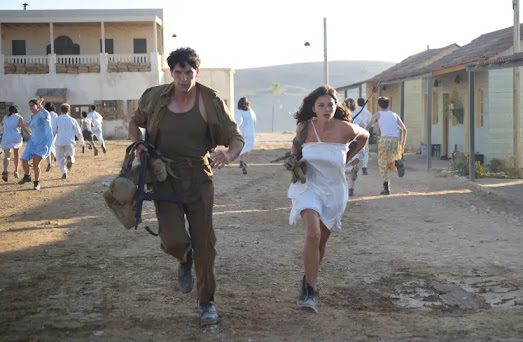Avi Nesher’s new high-budget and powerful film, Image of Victory (aka Portrait of Victory) tells two parallel stories about a battle of the 1948 war, particularly how the Egyptians conquered Kibbutz Nitzanim.
The film opens in 1978 when peace is announced between Egypt and
Israel. A successful Egyptian journalist
remembers back 30 years to a battle during the 1948 war when, as a young man,
he had been sent, with a cameraman, to shoot propaganda newsreels which would portray
victorious moments that would help King Farouk with his popularity. He remembers back to a battle against
Nitzanim. At that time, Nitzanim was a small kibbutz outpost (on the southern border
with Egypt). The young kibbutz members
and the army irregulars were poorly trained, naïve and idealistic. They were up
against the fedayeen and then later, up against the better equipped Egyptian
army.
The film is based on a true story of the defeat of Nitzanim. At that time, the kibbutz was outnumbered by the
powerful Egyptian army, but members of the kibbutz were told to hold the
line. Their eventual surrender, even
after many were killed in the fighting, was seen as a shameful defeat, leaving
a black mark on the history of the State of Israel, according to normative
Israeli history. This film was meant to
redress that terrible historical black mark. The film was billed in the media
as an anti-war film but it seemed to me to be much more of a nationalist
telling of the “real” story of what happened at Nitzanim. It makes some
of the kibbutzniks and soldiers into heroes and heroines, despite their defeat.
I really liked the fact that two parallel stories are
offered. One story is that of the
journalist who is dedicated to making a serious film, using also a love story
as a hook to bring in the Egyptian audience, but is forced to create army
propaganda. The second is the story of the kibbutzniks, as
personified in Mira, an extremely motivated and independent young woman, the
radio operator for the kibbutz, willing to die in defending her community. These two stories are somehow connected since
the journalist and his cameraman have their eyes on Mira, throughout the whole
film, as if to put a human face to the enemy.
Overall, I feel that it was a good film but not a great one. Many
of the characters were lacking in depth, and the script was often childish. Nevertheless,
it was a moving and authentic re-enactment of an important part of the War of
Independence, with a new twist. It was particularly fascinating to get a
glimpse of how some Egyptians saw us during that war, as not much more than a
bunch of colonizers who were settling on contested land. Bringing the Egyptian
narrative into the film was an important innovation—it allowed us to see “the
other side” for once in one of our wars, and help us get some insights into what
they were thinking and feeling.
Without offering a spoiler, history has taught us that Israel lost
the battle for Nitzanim, but Egypt never succeeded in its main goal of
destroying Tel Aviv (and eliminating the state of Israel!) and therefore Egypt
(and the other Arab countries) lost the war, even though they won this
particular battle. Historians in Israel in recent years have revealed that even
though the Arab armies were larger and better equipped (as we saw in this
film), the young Israeli army was better organized, which was one of the main
reasons that it was able to be victorious.
Avi Nesher is a highly acclaimed filmmaker and many of his films
have been previously reviewed on this blog.
In his earlier period, in the 70s, he made Sing Your Heart Out
(The Troupe) and Dizengoff 99. After a long period of filmmaking in
Hollywood, he returned to work in Israel and made Turn Left at the End of the World (2004), Secrets (2007), Matchmaker (2010), Wonders (2013),
Past Life (2016), The Other Story (2018).

No comments:
Post a Comment